Customer care is more important than before in the current fast-moving world. The clients demand fast services, individual support, and fluent connections. Nevertheless, to customers, it may not be easy to avail of this high level of service when their businesses handle a large number of customer inquiries. Here, AI-driven customer support solutions come into action.
Chatbots, virtual assistants, predictive analytics, and other AI technologies have transformed the way businesses communicate with customers. Making the performance of regular tasks automatic and supplying immediate answers. The AI helps optimize customer services, add to user experiences, and cut operational expenses.
What Is AI in Customer Support?
Artificial Intelligence (AI) stands for the capacity of machines to execute operations possible only with human intelligence.
In customer service, AI is intended to manage the interaction with the customers and interpret natural language, answer customers, and resolve problems without human involvement.
To enhance the automation and optimization of customer service, these systems utilize sophisticated technologies. Such as Machine Learning (ML), Natural Language Processing (NLP), and Speech Recognition.
Key AI Technologies of Customer Support Automation:
-
Natural Language Processing (NLP): Natural language Processing (NLP) is how the AI performs in ways that humans respond to the human language in conversational terms.
-
Machine Learning (ML): It makes AI systems able to learn how to act on the past experiences and evolve to fit the responses increasingly better.
-
Speech Recognition: It permits using voice to conduct transactions, opening speech-based interactions with AI about their understood spoken questions.
-
Predictive Analytics: Prepares solutions to customer challenges in advance using past data to determine customer needs.
How AI Enhances Customer Support With Automated Responses
AI is transforming the customer service world by automating the responses. The interactions are quicker, more efficient, and highly customized. What are the main ways that AI helps improve customer support?
1. Faster Response Times
Speed is the most noticeable advantage of customer service powered by AI. Customers nowadays demand immediate response to their queries and AI can give them that since it can give instant response to queries with commonly asked queries. With AI-powered systems, you can receive and respond to several queries simultaneously, thus saving a lot of time compared to human operators.
Example: Customer goes to the site of an online store and by means of a chatbot sends an inquiry regarding the availability of product, the delivery terms, etc. AI will give answers at the moment without delays which appear because of waiting of a human agent.
Benefits of Faster Response Times in AI Customer Support
| Benefit | Description |
|---|---|
| Instant Answers | AI will help answer the most commonly asked questions in real-time. |
| Handling High Volumes | AI may accommodate hundreds or thousands of requests at any one time guaranteeing efficiency. |
| Time Savings | The increased response time to the customers portrays greater customer satisfaction and effective service. |
2. 24/7 Availability
As opposed to human agents, AI systems can continuously work, performing tasks at any time of the day or night. AI-powered systems mean that a customer can always find assistance at any time of the day and even at the weekend or holiday. This is especially useful to the businesses whose customers are international or perhaps they might be in need in business outside of the business hours.
Example: AI chatbot would be useful to provide answers or assist with order tracking at any time of the day or night so that customers would not feel abandoned.
3. Handling High Volumes of Requests
The increase in the businesses also comes along with increase in the customer service requests. AI-driven systems shine when it comes to processing a large number of requests especially when the businesses experience regular tendencies or in some cases, seasonal interactions. This enables businesses to get constant and effective services in peak times, and they do not have to rely on recruiting more employees.
Examples: In case of a flash sale, an e-commerce web site may see thousands of customer requests simultaneously. All these requests may be dealt with at the same time by an AI chatbot, so no question of a customer will remain unanswered.
4. Personalization of Automated Responses
AI doent not only assist in automatization of responses, but they also make them personalized. Using customer information, AI will be able to study past customer experiences, their crossings, and preferences and hence, make suggestions and replies to individual customers according to their needs.
Example: A client on the site of a retailer can have a recommendation of the products purchased recently or viewed earlier on the site made by an AI-based assistant. This makes this experience more compelling, and the chances of conversion are higher.
Using AI to power customer service systems saves a great deal of money on operations, as some of the routine jobs will be automated, and answered under high traffic. In addition, no new human workforce will be required. Companies are in a position to allow their human representatives deal with more complicated and valuable interactions and leave the standard requests to the AI.
Example: A big corporation can apply AI to automate frequent requests like checking the balance of your account, changing a password, or tracking an order. This minimizes the amount of agents required in performing basic tasks, reducing staffing costs.
6. Consistency and Accuracy
Consistency and accuracy of responses is one of the major strengths of AI. The answers that are offered through AI-powered systems are standard and do not cause variations, in addition to the possibility of errors and inconsistencies depending on the human agent to provide the answer, unlike in the case of AI-powered systems where customers are guaranteed to get the same information each time.
Example: A customer should contact the support either at night or at the morning, he/she will be provided with always the same clear and correct answer to the question of the return policy without any twists caused by the human factor.
Real-World Applications of AI in Customer Support
The use of AI-driven systems in customer service operations has already been successfully adopted in different industries. Some of the ways through which AI is being used to strengthen customer support are as below:
1. E-commerce
In the e-commerce market, AI is revolutionizing customer service, automatizing the orders requests, product advise and handling returns. Using AI-based chatbots, customers can locate goods, track the inventory, and shipment status without any interruptions.
Example: Sephora employs an AI-enabled chatbot, with which customers can find products. The products corresponding to their preferences and skin tones and have a better shopping experience and generate more sales.
2. Healthcare
Customers can use systems based on artificial intelligence to schedule appointments, resolve medical related questions and track prescriptions to streamline the healthcare services. AI-powered virtual health assistants can instantly solve standard questions and lower wait time and increase patient satisfaction.
Examples: Babylon Health, a telemedicine platform, applies AI to offer personalized health consultation on their app, giving patients the ability to receive an opinion on non-acute health concerns without scheduling a doctor appointment.
3. Telecommunications
The telecom companies are implementing AI to handle most of the regular customer services, like trouble-shooting, billing questions and account management. With the help of AI systems, service problems can be easily eliminated as customers will be prompted through troubleshooting processes or user can be referred to the department.
Example: AT&T applies AI to help people manage their account and fix issues faster, leaving customer representatives free to connect with customers whose issues cannot be resolved by AI.
4. Banking and Finance
In the banking system, it applies AI-based technology to manage mundane activities such as balance enquiry, alert messages on fraud transactions, and money transfer. Automation of these processes allows the banks to use their human agents in more complicated matters whilst offering the customers an efficient and quicker service.
Example: The Bank of America has an AI-powered virtual assistant Erica, which aids clients in various activities, such as balance checks, bill payments, or payments. This guarantees fast and precise service to the customers diminishing wait-time.
Challenges of Implementing AI-Driven Customer Service
Even though all these benefits are present, there are a few obstacles that business can encounter after implementing AI in their customer support technologies:
1. Data Privacy and Security Concerns
The use of AI systems is based on rich customer statistics, which is attributed to the issues of data security and privacy. Because of this, customers are becoming more conscious about the usage of their data, and it is very important to businesses to make sure that they are keeping explicit information and follow the rules of data protection policies such as GDPR and CCPA.
2. Handling Complex Queries
Although AI is an effective tool at performing straightforward tasks, it might not be effective in scenarios when customers have complicated or sensitive cases. As an example, emotionally urgent cases or extremely specialized requests might demand the sympathy and insight available only to the work of human resources.
3. Integration with Existing Systems
To incorporate AI-powered systems into its current customer care systems, it may be very difficult, especially when businesses have legacy systems. To make the implementation of AI-powered support structures successful. It is necessary to ensure that integration with existing platforms and databases will be made smoothly.
Emerging Trends in AI-Driven Customer Service
With the constant development of the AI technology, its customer support operations are also changing. The future of customer service carried out with the help of AI is quite promising, and there are many interesting things that can happen. The following are some of the emerging trends which will determine the future of AI in customer service:
1. Conversational AI for Complex Customer Interactions
Conversational AI opens the door to more complex customer interactions and conversations than chatbots and virtual assistants were historically designed to cover, including simple requests and frequently asked questions. AI systems can comprehend context, subtext, and emotion in conversations between customers, which makes it sound more natural, emulating human communication through the use of Natural Language Processing (NLP) and machine learning (ML).
Example: Google Dialogflow and IBM Watson Assistant can be discussed, as they allow organizations to create more complex conversational agents to handle more complex conversations with customers, such as product inquiries, technical support, and account management, all within a unified flow.
These technologies enable even automated interactions between business and people to be personal and almost natural so that it seems just like a person and not a robot.
2. AI-Powered Personalization Across Channels
AI is not just about automating tasks. But it is becoming an inseparable part of providing personal customer service along various touchpoints. As more businesses adopt AI in their omnichannel customer support solution. It means they can provide a unified, personalized experience. Specifically when that customer is reaching out to the customer care via email, live chat, voice, or even social media.
AI has the potential to gather and interpret information across every point of customer contact and allow businesses to deliver exceptional offers, personalized product suggestions, and channel-level assistance.
Example: Zendesk and Salesforce have also incorporated AI on email, live chat, and social media fronts to make sure that customers are always provided with personalized support, irrespective of their preferred channel.
3. Voice AI for Hands-Free Customer Service
As microphone-enabled gadgets such as Amazon Alexa, Google Assistant, or Apple Siri have become more and more popular, voice artificial intelligence will also play a vital role in the event of automating customer service. Combining speech recognition and natural language understanding (NLU), companies can create the voice-based assistance, which will give consumers a hands-free experience, as well as a convenient one.
Voice AI is capable of doing all the functionalities (simple questions to complex transaction like making a booking, transactions, and troubleshooting of problems) all through voice commands.
Examples: American Express and Capital One have also implemented the voice assistant on their mobile apps with the help of AI, which enables customers to access account balances, transfer money and pay bills with the voice.
4. Proactive Customer Service through AI
Artificial intelligence is also being embraced in the provision of proactive customer services. Instead of waiting until the customers come to them, AI will be able to process customer information and predict their needs, or problems, before they happen. To illustrate, AI is able to sense a possible problem with a product, service or delivery and contact the customer to make an update or resolution before the customer knows they have an issue.
Example: Netflix applies the AI to submit recommendations to the customer after watching their history. Moreover, the AI-based predictive maintenance system used by companies such as Airlines helps to locate the problem with equipment so that they could inform the customers and allow delay to avoid such incidents.
5. AI for Handling Multilingual Customer Service
In this modern era that is characterized by globalization, a business must provide a client support in more than one language. The use of the AI-driven translation solution is also making multilingual customer care with human translation agents obsolete. These applications enable companies to cross the language barriers in a swift and precise manner providing new and precise translations between various languages.
Example: Google Translate and DeepL can assist companies with multilingual service in real-time. The helping by translating customer-to-AI-chatbot or customer-to-AI-agent conversations on the fly.
Real-World Success Stories of AI in Customer Support
Various companies have already effectively adopted AI-based customer service platforms that resulted in an increase in operational effectiveness, customer satisfaction, and saving costs. Few practical cases are given here:
1. H&M: AI Chatbots for Seamless Customer Service
To enhance the customer shopping experience, H&M, the international fashion retailer, has added chatbots to its service provision strategy and powered them using AI. On the one hand, the AI chatbot is helping customers locate products, get answers to such questions as whether it is available or in-stock, and also help in the checkout process.
Automating these jobs has helped H&M to minimize response time, customer satisfaction and conversion rates have also improved and the operational cost stayed at bay.
2. Bank of America: Erica, the AI Assistant
Bank of America released a virtual assistant Erica that uses artificial intelligence technologies and allows customers to manage general financial services, including balance checks, payments, money transfers, and referring to personal financial advice. POS is a technological innovation that allows Erica to operate through machine learning and natural language processing in order to provide a conversational interface, which is natural and intuitive.
After the introduction of Erica, Bank of America has experienced more customer interaction and light workloads among customer care agents who can now attend to more complex customer questions.
3. KLM Royal Dutch Airlines: AI for Streamlined Customer Service
KLM Royal Dutch Airlines applies AI-powered chatbots to manage the customer support requests of its customers through a variety of channels, such as social media and messaging applications. BB is the chatbot of the airline which guides a customer in purchasing tickets, receiving information about the flights, and answering queries concerning the rules of baggage and other facilities.
By incorporating AI, KLM has logged a considerable decrease in the time of response and has been able to cope with customer service during high travel seasons, whilst still offering their customers a more effective and personalized service.
4. Vodafone: AI to Improve Customer Service and Troubleshooting
Vodafone is a multinational telecommunications corporation that has adopted an AI-based approach to customer service with the aim of replacing human customer service representatives and automating troubleshooting and technical support. TOBi is the chatbot developing by the firm that promotes its customers to resolve some of the frequently asked questions like paying bills, persistence of the service, and managing accounts.
With these processing using AI, to automate many of these processes, Vodafone has been able to apply less force to its human agents in terms of workload, increasing the velocity and precision of the customer service experience through the human agents contact.
Summary
Automated customer service response solutions that use AI are redefining business-customer communication. AI is transforming customer service in all industries, whether through quicker approach to the customers, customization of the process, 24/7 customer service, and cost. Though, there are still some challenges like data privacy, complex queries, and integration with the existing system but with proper approach and hybrid strategy of implementation of AI, business can easily mitigate these challenges.
Customer service leaders of tomorrow will be those that embrace AI, and emerging aspects of this technology, including conversational AI, predictive analytics and voice assistant, will also spearhead more efficient, personal and scalable support systems. With new customer service with the help of AI, businesses can increase their efficiency, better target their customers, and respond to the challenges of the changing digital world.



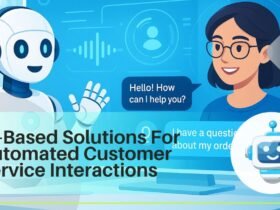









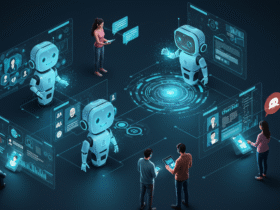


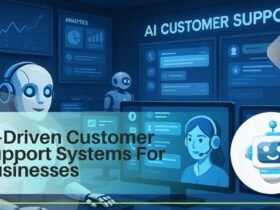

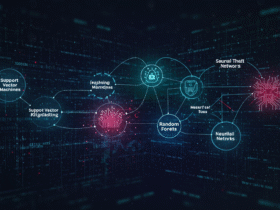







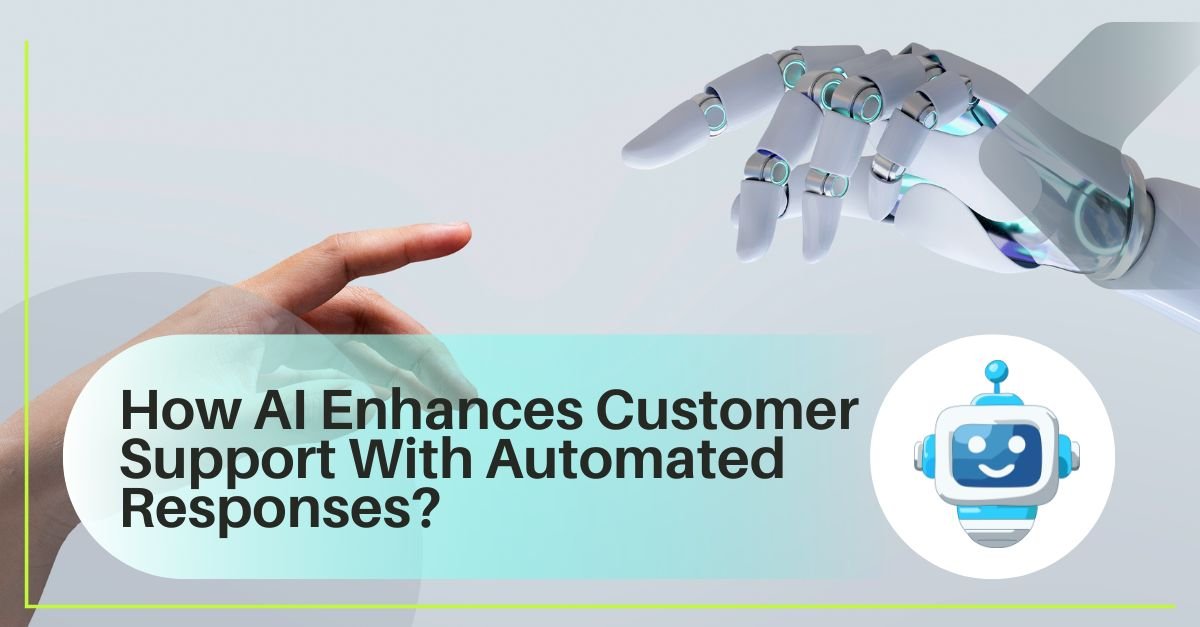


Leave a Reply